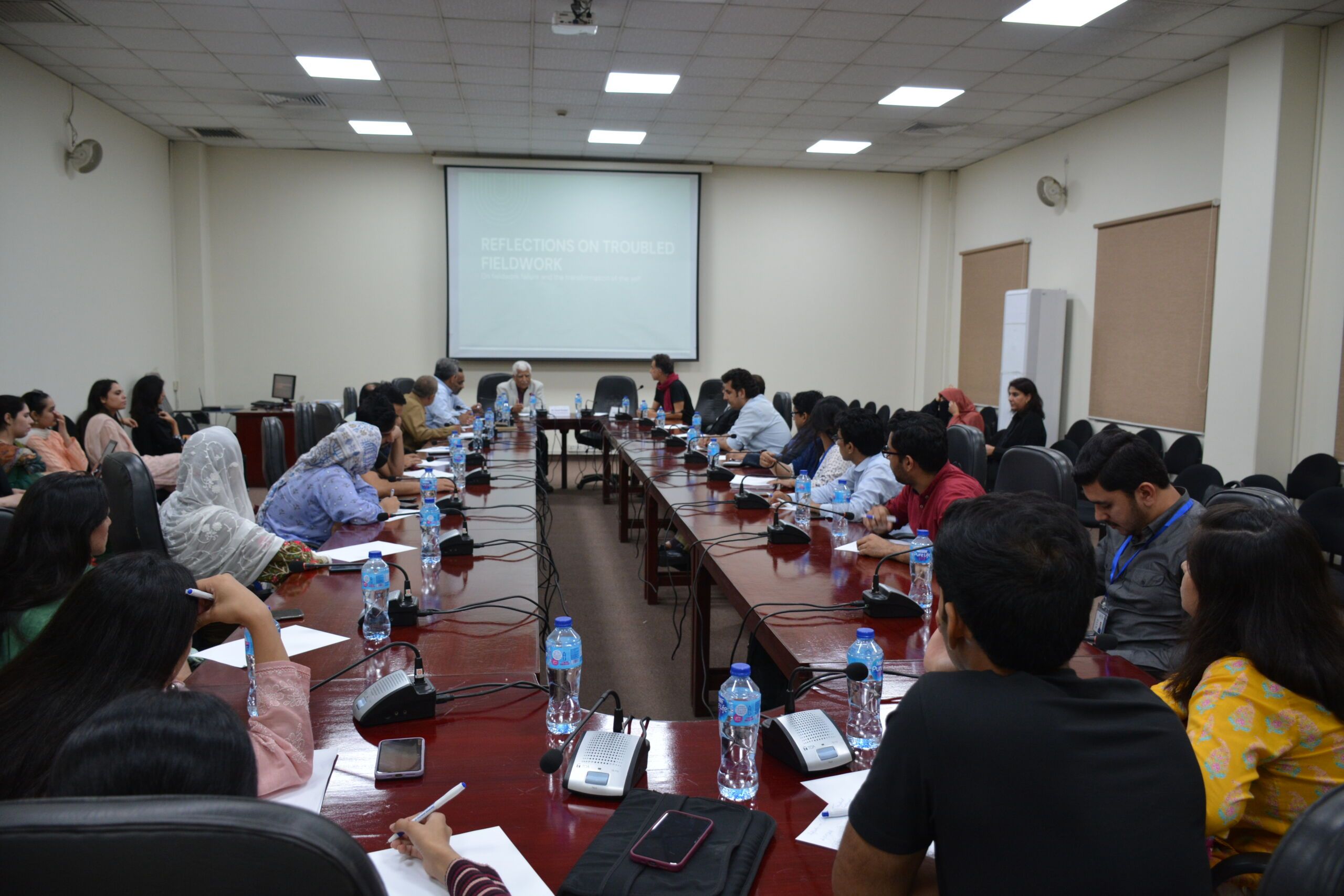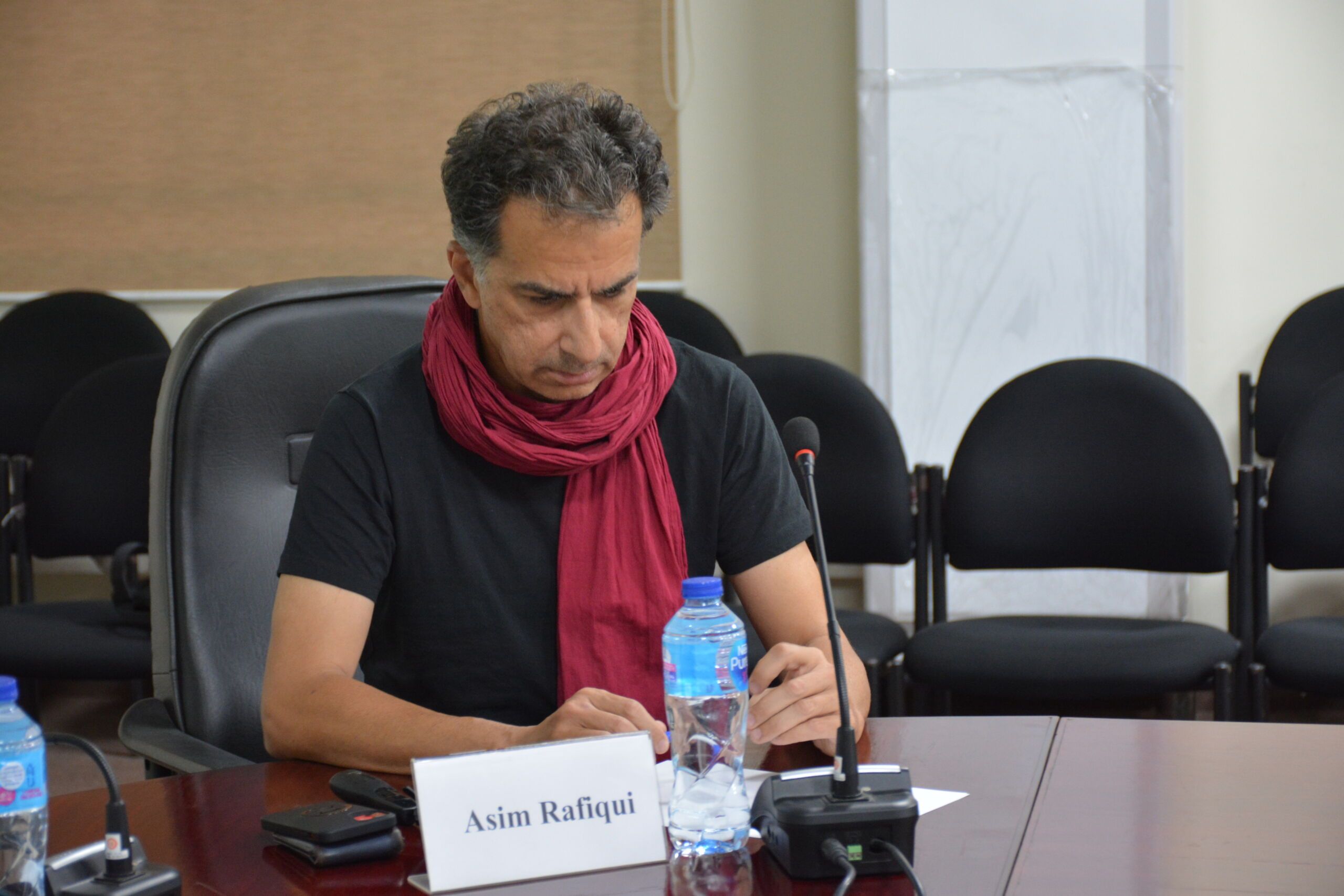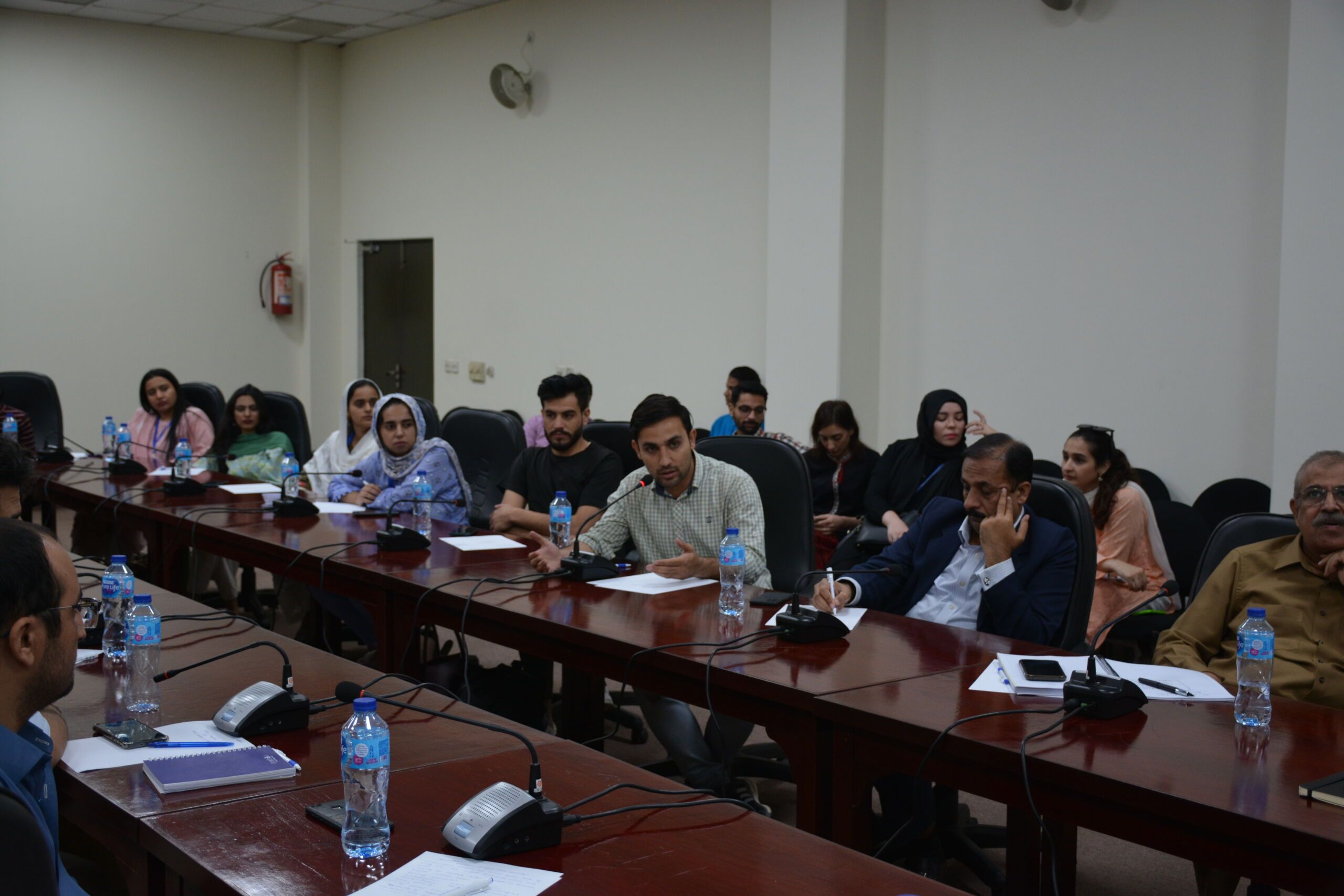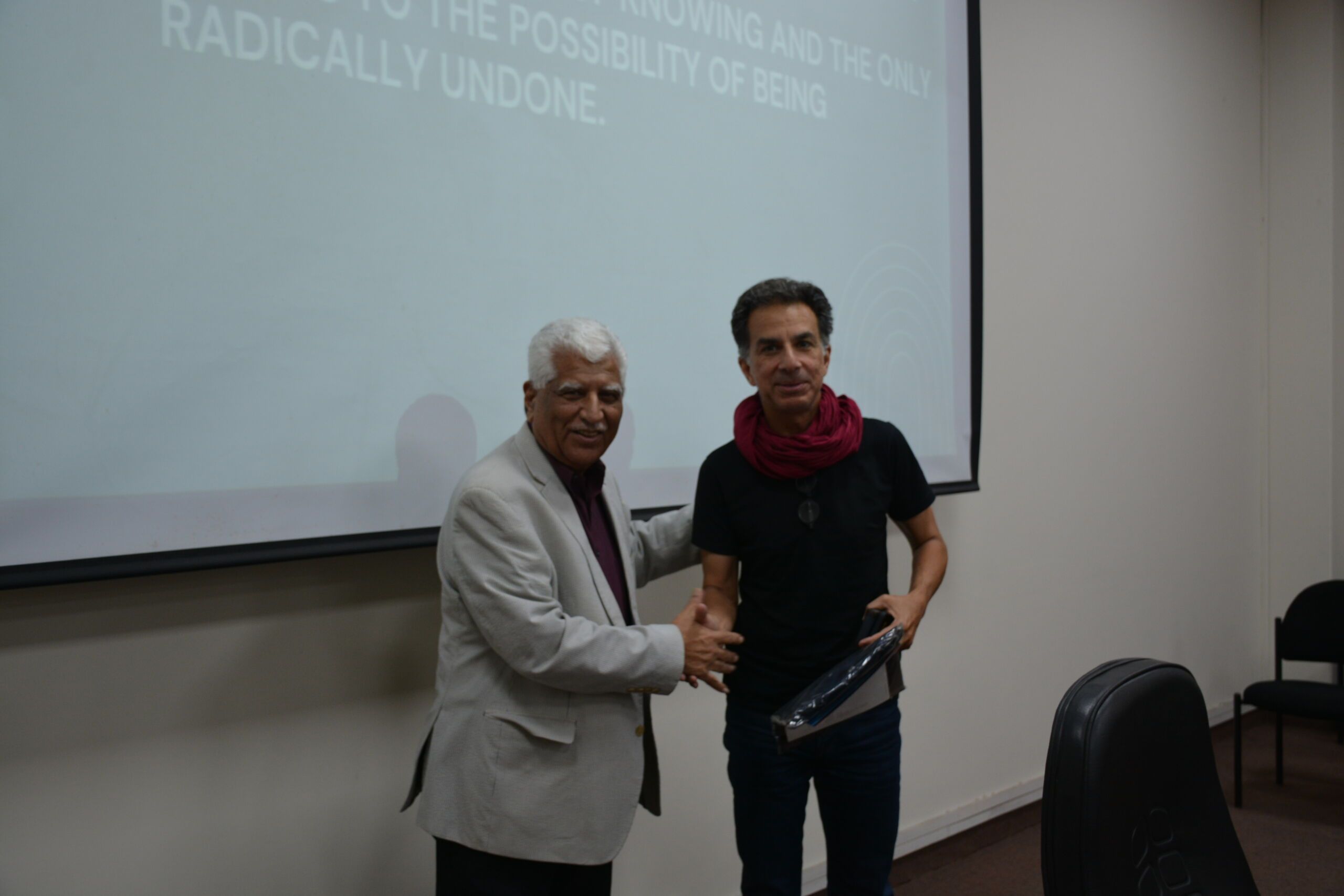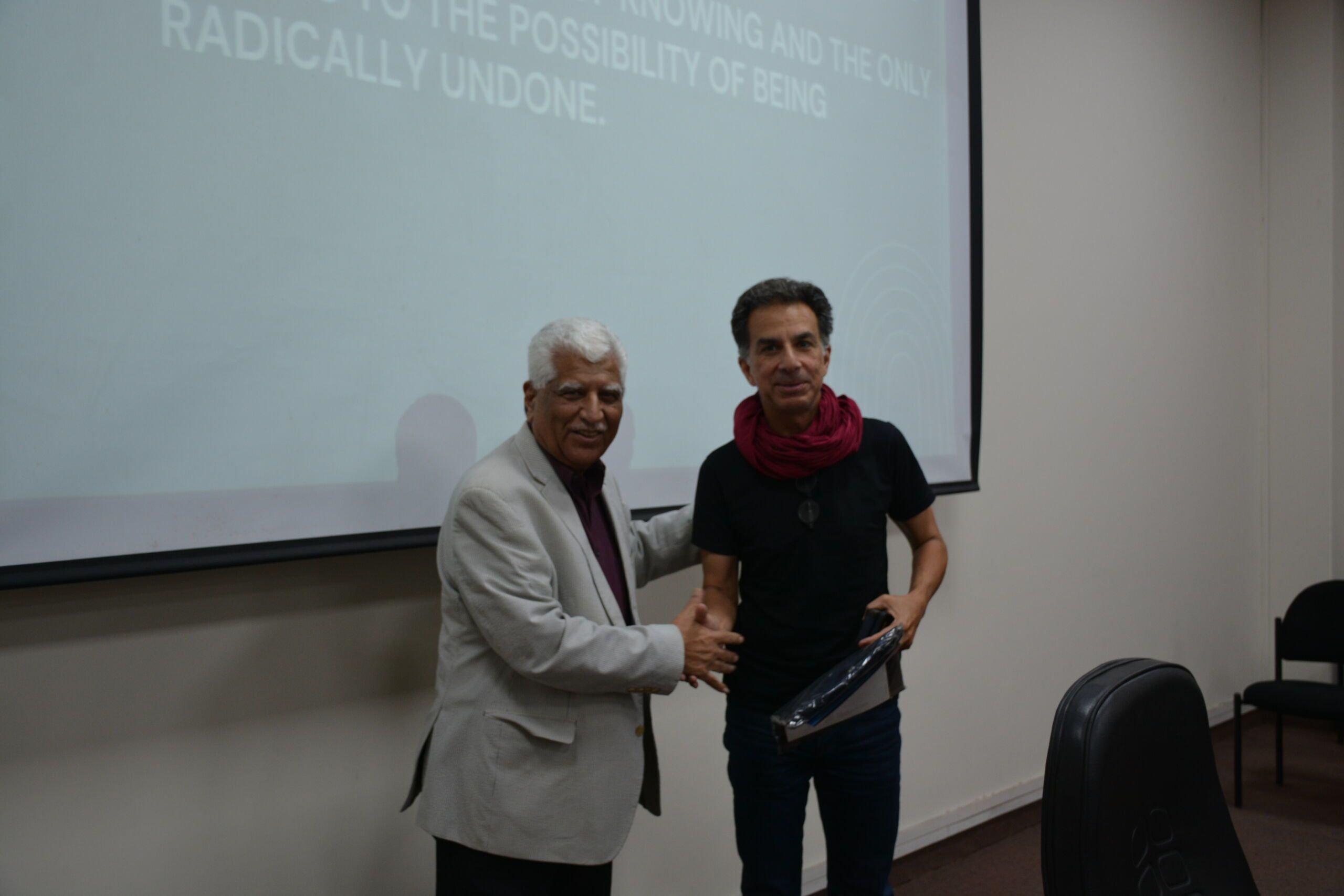
Reflections on Gwadar: Troubled Fieldwork
Seminar
Past Event
Oct 26, 2023 - 4:00 pm |
Jan 26, 2024 - 6:00 pm
Asim Rafiqui
E-002 CPPG FCCU
Upcoming Event
On Thursday, October 26, 2023, CPPG organized a seminar on “Reflections on Gwadar: Troubled Fieldwork”. Asim Rafiqui, a social anthropologist and a PhD candidate at TU Delft, Netherlands was invited to speak on the subject. Rafiqi spent the last two years conducting ethnographic fieldwork with the Mahigeer community (fishers) of Gwadar. Through his research, he was able to understand and record the seascape epistemologies and literacies of Balochistan. The session was moderated by Dr. Saeed Shafqat, the Founding Director and Professor at CPPG.
Initiating his presentation, Rafiqui started by delving into the intrinsic importance of fieldwork and the transformative impact it holds in shaping policies. He first pointed out the need to experience a place firsthand to bring forward meaningful policy changes. For this, he argued a researcher needs to extend beyond the limited lens of formed theories and methodologies. Sharing his own experience, he contended that his research work was based in the vibrant landscape near Mula Band, Durya, and Mohallaband, where the Mahigeer community resides. In this close-knit community, there is mutual familiarity among Gawadar residents, showcasing a profound sense of interconnectedness. Within this geographical backdrop, there is “invisible mapping.” This intricate mapping, unseen at first glance, hints at layers of societal connections and dynamics that operate beneath the surface proving that the communities of Gawadar extend far beyond the visible.
Extending his argument on the significance of fieldwork, Rafiqui delved into the importance of the ethnography of law and the politics of visibility. He argued that it is important to see how laws circulate down to the grassroots level as this exploration helps in understanding the experiential application of laws by the people. Moreover, talking about the politics of visibility, Rafiqui questioned whether showcasing certain aspects of a community enhances its power and accountability. He questioned the veracity of this claim arguing that this is an unexamined assumption that there is a relationship between the politics of visibility and the political empowerment of historically marginalized communities. He remarked that visibility is a trap which is evident in the ways electronic and social media data has been used to recreate crimes in forensic investigations. Rather than politically empowering communities, visibility inadvertently feeds into building state-controlled narratives. States are much more informed about the happenings and they manage, and circulate different kinds of narratives. They also use narratives of human rights to control social media. Thus, if one intends to carry out research, one should bring oneself to the field to underscore the real-life happenings and stories.
Coming to the next step of choosing a topic for research, Rafiqui argued that he found an overwhelming amount of research on Gawadar regarding infrastructure, development, poverty, marginalization, geopolitics, resources, etc. However, there was not a single study on the Mahigeer community. Referring to the general standard of research interest, he said that usually port cities are studied through the lens of these over-determined themes involving infrastructure and logistics. This is what he referred to as the creation of an “idealized research subject”. However, this idealization of research was soon broken for him when he encountered the reality surrounding the Mahigeer community, communicating a story unidentified by these formulated and over-determined themes. Therefore, for a researcher, he remarked, it is important to move from these generalized perceptions and focus on listening to a story rather than making a story you have already conceived.
Further drawing attention to the oxymoron relationship between the expectations of a researcher before going for fieldwork and what happens when one undergoes the experience itself, he shared the multifaceted challenges faced during fieldwork, emphasizing intense refusal at various levels. He shared that he felt a sense of rejection from the Mahigeer community on the selection of themes, frameworks, questionnaires, etc. He noticed that his questions were not comprehendible for them and their answers were not comprehendible for him. These epistemic confusions created a disconnect between him and the community which seemed hard to overcome. Moreover, he was equipped with a unique set of logistical challenges as well including issues with deadlines, data collection, and the reluctance of the community to share information. Rafiqui highlighted the existence of strange silences and rejections that illustrated how the community had preconceived expectations that influenced the interactions between him and them.
Amidst such rejection, Rafiqui was able to find his silver lining when he started adopting alternative methods such as writing blogs and essays to capture nuanced details and overcome literacy differences. It became apparent that the community’s resistance took a distinct form- reading stars, oceans, and waves and predicting weather conditions, all became comprehendible for him which he initially struggled to see. He was then able to see the mistake in his initial approach, realizing that the world does not bend for the researcher rather the researcher has to bend to understand things on a deeper level.
As Rafiqui moved with a more nuanced understanding, he was able to gather support from his students in Gawadar, to which he taught photography. Collaborating with students, he conducted workshops and as students ventured through the streets of the neighborhood for their projects, he was able to tag along and gain information by listening to the conversations obtaining valuable insights and knowledge about the community. Through the help of his students, whom he regarded as ‘the gift”, he was able to understand the stories of the Mahigeer community that revealed their sense of identity which was not an individual one rather it was created through their relationship with others, the land, the sea, the other natural elements and even other than human life i.e., djinns and fish.
Further coming to the construction of knowledge that makes a researcher adopt the general ways, he highlighted that this needs to be studied under the semiotics and what we consider as knowledge. Elaborating Heidigger’s point of view in The Age of the World Picture, he argued that there is a large gap between what we consider as knowledge and what is knowledge for indigenous people. He argued that there is a disparity between modern scientific knowledge with its pre-existing forms. The current Post-Enlightenment thought, centered on modeling, confines knowledge to the certainty of representation. Here, representation not only serves as a model of the real but reinforces the belief in its undeniable reality. This modern knowledge, deeply rooted in modeling, becomes a mechanism of control, fostering domination over nature and humanity.
It is this better understanding of the concept of knowledge that helped Rafiqui to surrender the preconceived frameworks when engaging with the Mahigeer community. Through his research, he was able to understand that there is never a single form of literacy rather there are multiple literacies indicating that no one form of knowledge is superior to another. Hence, researchers need to move beyond the “I” and then willingly become the “instructed third”. This transformative process involves leaving the preconceived notions and engaging with others on a middle ground. This does not necessitate data and surveys but rather a willingness to become someone who has traveled, transformed, and opened oneself for a different experience.
The session was followed by a stimulating Q&A session. Dr. Saeed Shafqat thanked the speaker for such an insightful presentation that brought a nuanced understanding of research methodologies and frameworks for the students and researchers.


